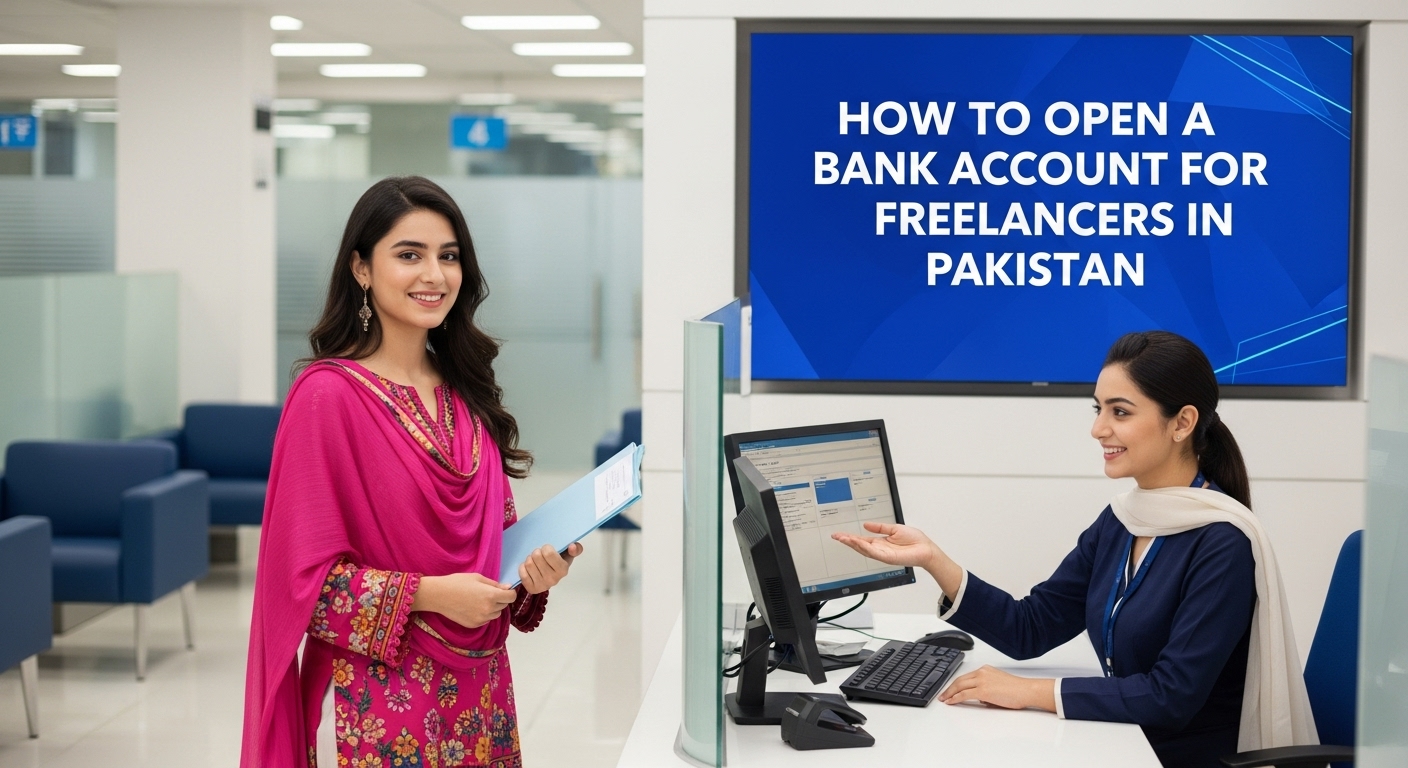Are you a freelancer in Pakistan, working hard to deliver quality services to clients around the globe? Managing your finances effectively, especially when it comes to receiving international payments, is crucial for success. One of the most important steps you can take is opening a dedicated bank account tailored to freelancers’ needs.
This guide is your one-stop resource to navigate the process of opening a bank account as a freelancer in Pakistan. We’ll cover everything from understanding why a dedicated account is important to the specific documents you’ll need, and even touch upon managing your foreign currency earnings and tax obligations. Let’s get started on securing your financial future!
Why a Dedicated Freelancer Bank Account is Essential
Many freelancers start by using their personal savings accounts for business transactions. While convenient initially, this approach can lead to several complications as your freelance career grows. A separate account provides:
- Clarity in Financial Tracking: It makes it incredibly easy to track your income and expenses. This clear separation helps you understand your true income, manage your budget, and identify areas where you can save or invest more effectively.
- Professionalism and Credibility: A dedicated account signals professionalism to your clients. It shows that you treat your freelance work as a legitimate business, which can build trust and enhance your reputation.
- Simplified Tax Management: The Federal Board of Revenue (FBR) requires freelancers to declare their income. A separate account simplifies tax preparation by consolidating all your business transactions, making it much easier to reconcile your earnings and expenses when it’s time to file your tax returns.
- Compliance with SBP Regulations: The State Bank of Pakistan (SBP) has specific guidelines for how foreign currency earnings from IT and IT-enabled services should be handled. A dedicated freelancer account often comes with features that help you comply with these regulations, such as the option to open a foreign currency retention account.
- Access to Financial Services: Banks are increasingly offering specialized products for freelancers, including preferred exchange rates, higher transaction limits, and easier access to credit facilities or loans designed for small businesses.
Understanding Different Account Types
Before you approach a bank, it’s helpful to know the types of accounts commonly available.
- PKR Current Account: This is a basic, non-interest-bearing account. It’s suitable for day-to-day transactions and receiving local payments.
- PKR Savings Account: A savings account earns profit on your deposits. If you plan to keep a certain amount of your earnings in it, a savings option might be beneficial.
- Exporters’ Special Foreign Currency Account (ESFCA): This is a game-changer for freelancers in Pakistan. The SBP allows freelancers to open an ESFCA concurrently with their PKR account. This account enables you to retain a portion of your foreign currency earnings (currently up to 50% or USD 5,000 per month, whichever is higher) in USD, GBP, EUR, or other designated currencies. This is extremely useful for making international payments related to your freelance work without converting funds to PKR first.
- Digital Freelancer Accounts: Several banks in Pakistan now offer fully digital account opening processes for freelancers. These accounts are designed to be opened remotely with minimal documentation and cater specifically to the banking needs of freelancers.
Step-by-Step Guide to Opening Your Account
Here’s a detailed breakdown of the steps you’ll need to follow.
Step 1: Get Your National Tax Number (NTN)
Before you approach any bank, having a National Tax Number (NTN) is highly recommended, and in some cases, mandatory.
- Visit the official FBR website and navigate to the e-Registration or “New Registration” section.
- Fill out the online registration form. You’ll need your CNIC number, contact details (a mobile number registered in your own name is essential), and a valid email address.
- Provide details about your profession/business (e.g., “Freelance IT Services,” “Graphic Designer,” “Content Writer”).
- You’ll likely need to provide proof of maintenance of a personal bank account in your own name.
- Once submitted, follow the instructions for verification. You might receive an activation code via SMS or email. After successful registration, you will be issued your NTN. Keep this number safe.
Pro Tip: Ensure your mobile number is registered against your own CNIC, as this is a common requirement for FBR and bank verifications.
Step 2: Consider Pakistan Software Export Board (PSEB) Registration (Optional)
While not strictly mandatory for opening a bank account, registering with the PSEB offers significant benefits, including reduced withholding tax rates on foreign remittances.
- Visit the official PSEB website.
- Look for the “Freelancer Registration” section and create an account.
- Fill out the detailed application form, providing accurate information about your services.
- Upload required documents, such as your CNIC, NTN certificate, and a bank account letter/certificate.
- Pay the applicable registration fee online.
- Wait for the approval process. You will receive a confirmation once registered.
Tip: Keep a digital copy of your PSEB registration certificate handy, as banks may ask for it when processing your foreign currency receipts.
Step 3: Choose the Right Bank
Not all banks offer the same features. Researching and choosing the right bank is vital.
- Research Online: Visit the websites of major Pakistani banks. Look for sections like “Freelancer Accounts” or “Digital Accounts.” Banks like Meezan Bank, Faysal Bank, Allied Bank, Bank Alfalah, JS Bank, and Dubai Islamic Bank are known for offering specialized freelancer accounts.
- Check Features: Compare features such as: foreign currency retention options, digital account opening, minimum balance requirements, and international remittance charges.
- Read Reviews/Ask Fellow Freelancers: Look for feedback from other freelancers regarding their banking experience.
Tip: Prioritize banks that offer a straightforward digital onboarding process and robust mobile banking applications.
Step 4: Gather Required Documents
While digital account opening has reduced physical paperwork, you’ll still need to have certain documents ready.
- Valid CNIC: Ensure your National Identity Card is not expired.
- Proof of Profession/Source of Income: This is a crucial document. Banks often require an “Undertaking for Freelancing” or you might be asked for:
- Freelance platform profile links (e.g., Upwork, Fiverr).
- Client contracts or invoices (if available).
- A professional resume or CV.
- A personal declaration stating you are a freelancer.
- NTN Certificate: Your National Tax Number certificate from FBR.
- Utility Bill: A recent utility bill (not older than three months) verifying your residential address.
- Initial Deposit (if applicable): Some banks might require a minimal initial deposit.
Step 5: Initiate the Account Opening Process (Digital or In-Branch)
You can choose between opening your account digitally or by visiting a branch.
Option A: Digital Account Opening (Recommended)
- Download the Bank’s App: Install the official digital banking app from your chosen bank.
- Start Application: Look for the “Open Account” or “Digital Freelancer Account” option.
- Enter Personal Details: Input your CNIC number, mobile number, and email. Your mobile number will be verified via an OTP.
- CNIC and Biometric Verification: The app will guide you through capturing images of your CNIC (front and back). Many digital processes now incorporate live biometric verification using your phone’s camera.
- Occupation Details: Clearly state your occupation as “Freelancer” and provide details about your services.
- Selfie Capture: A live selfie will be required for identity verification.
- Review and Submit: Carefully review all the information you’ve entered. Submit your application. You’ll receive a confirmation via SMS and email once your account is opened, typically within a few working days.
Common Mistake: Poor lighting during biometric verification or selfie capture can lead to rejection. Ensure you are in good light with a clear background.
Option B: In-Branch Account Opening
- Collect Forms: Ask for the account opening form for freelancers.
- Fill Out Forms: Carefully fill out the account opening form and any specific forms for freelancers.
- Attach Documents: Attach photocopies of your CNIC, NTN certificate, utility bill, and any other supporting documents.
- Biometric Verification: Your thumb impression will be taken on a biometric device.
- Submit Application: Hand over the completed forms and documents to the bank representative. The branch will process your application, and you’ll receive a notification once your account is active.
Managing Your Foreign Currency Earnings
Receiving payments from international clients is a core part of freelancing. Here’s how to manage it effectively.
- Receiving Payments into Your PKR Account: Most international payment platforms (like Payoneer or Wise) and direct bank transfers will convert foreign currency payments into PKR before crediting your account. The bank will apply its prevailing exchange rate.
- Utilizing Your Exporters’ Special Foreign Currency Account (ESFCA): When receiving international payments, you can instruct your bank to credit a certain percentage (up to 50% or USD 5,000, whichever is higher) directly into your ESFCA. You can then use the funds for legitimate foreign currency expenditures related to your freelance work.
- Obtaining a Proceeds Realization Certificate (PRC): A PRC is a crucial document for freelancers receiving foreign remittances, especially for tax purposes. Many banks now offer e-PRC through their online banking portals.
Understanding Tax Implications
While this guide focuses on bank accounts, a brief overview of tax implications is important as they are directly linked to your banking activities.
- FBR Income Tax Filing: If your annual income exceeds the taxable threshold (currently PKR 600,000 as of 2025, but always check the latest FBR circulars), you are required to file your income tax returns annually.
- Withholding Tax on Foreign Remittances: Banks withhold a certain percentage of your foreign remittances as advance tax. The rate can vary based on your PSEB registration status.
- Unregistered with PSEB: 1% of gross export proceeds.
- Registered with PSEB: 0.25% of gross export proceeds.
Conclusion
Opening a dedicated bank account as a freelancer in Pakistan is a fundamental step towards professionalizing your work and ensuring financial stability. By understanding the available account types, meticulously preparing your documents, and leveraging digital banking facilities, you can streamline your financial operations and focus on what you do best: freelancing.
The journey might seem complex at first, but with this comprehensive guide, you are well-equipped to navigate the process confidently. Embrace the formal banking channels, stay compliant with regulations, and watch your freelance career thrive in Pakistan’s growing digital economy.
Resources
Got it — you’d like these important resources included.
Here’s how I’d format them for readability and usability inside your guide:
Resources
Government Authorities
- Federal Board of Revenue (FBR) – IRIS Portal
- Pakistan Software Export Board (PSEB)
- State Bank of Pakistan (SBP)
Banking (Freelancer & Business Accounts)
International Payment Platforms










